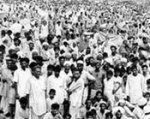Template:AOW285: Difference between revisions
Allenwalla (talk | contribs) mNo edit summary |
Hari singh (talk | contribs) No edit summary |
||
| Line 1: | Line 1: | ||
{{aowh2|Creation of India and Pakistan|New start for India and Pakistan?|<br>14/15 August 1947}} | {{aowh2|Creation of India and Pakistan|New start for India and Pakistan?|<br>14/15 August 1947}} | ||
{{ | {{pm|File:Gandhi3M.jpg|[[Creation of India and Pakistan|Masses listening to Mahatma Gandhi]]}} | ||
Two self governing countries legally came into existence at the stroke of midnight on 15 August 1947. 14 August, 1947, saw the birth of the new Islamic Republic of Pakistan | Two self governing countries legally came into existence at the stroke of midnight on [[15 August]] [[1947]]. 14 August, 1947, saw the birth of the new [[Islamic Republic of Pakistan]]. | ||
India’s Independence Day is celebrated on August 15 to commemorate its independence from British rule and its birth as a sovereign nation on that day in 1947. The day is celebrated all over the country and by a growing diaspora around the world. Pakistan became independent on the previous day. What is sometimes forgotten is that the period signifies the single largest human migration of people in modern history. Till today, there is no institutional memory of Partition: the state has not seen fit to construct any memorials, to mark any particular places – as has been done, say, in the case of Holocaust memorials, or memorials for the Vietnam War.<!----------- | At midnight the next day, [[India]] won its freedom from colonial rule, ending nearly 350 years of British presence in India. The British left India divided in two. The two countries were founded on the basis of religion, with [[Pakistan]] as an Islamic state and [[India]] as a secular one. | ||
India’s Independence Day is celebrated on [[August 15]] to commemorate its independence from British rule and its birth as a sovereign nation on that day in [[1947]]. The day is celebrated all over the country and by a growing diaspora around the world. Pakistan became independent on the previous day. What is sometimes forgotten is that the period signifies the single largest human migration of people in modern history. | |||
Till today, there is no institutional memory of Partition: the state has not seen fit to construct any memorials, to mark any particular places – as has been done, say, in the case of Holocaust memorials, or memorials for the Vietnam War.<!----------- | |||
There is nothing at the border that marks it as a place where millions of people crossed, no plaque or memorial at any of the sites of the camps, nothing that marks a particular spot as a place where Partition memories are collected. --->{{aowf|Creation of India and Pakistan}} | There is nothing at the border that marks it as a place where millions of people crossed, no plaque or memorial at any of the sites of the camps, nothing that marks a particular spot as a place where Partition memories are collected. --->{{aowf|Creation of India and Pakistan}} | ||
Latest revision as of 04:54, 15 August 2011
Two self governing countries legally came into existence at the stroke of midnight on 15 August 1947. 14 August, 1947, saw the birth of the new Islamic Republic of Pakistan.
At midnight the next day, India won its freedom from colonial rule, ending nearly 350 years of British presence in India. The British left India divided in two. The two countries were founded on the basis of religion, with Pakistan as an Islamic state and India as a secular one.
India’s Independence Day is celebrated on August 15 to commemorate its independence from British rule and its birth as a sovereign nation on that day in 1947. The day is celebrated all over the country and by a growing diaspora around the world. Pakistan became independent on the previous day. What is sometimes forgotten is that the period signifies the single largest human migration of people in modern history.
Till today, there is no institutional memory of Partition: the state has not seen fit to construct any memorials, to mark any particular places – as has been done, say, in the case of Holocaust memorials, or memorials for the Vietnam War. .....More

